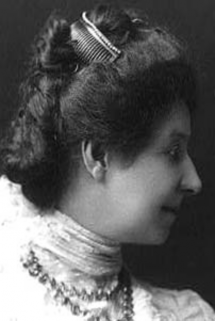
|
|
Abstract: Whiting (1847-1942) was an American journalist, essayist, and poet; a religious seeker, she showed interest in the Bahá'í teachings. Notes: |
 Lilian Whiting, c. 1904. Courtesy of the Library of Congress (LC-USZ62-93461). |
In 1876 Whiting went to St. Louis, Missouri, where she began her journalistic career. She called this time the beginning of her "conscious life." It was in St. Louis that Whiting met and was influenced by a group of people, "idealists" she said, who had formed a philosophical club. She attended the lectures of Susan Blow, a member of the club active in the movement for progressive education of children. She listened to Dr. William Torrey Harris, founder of the club, and read his Journal of Speculative Philosophy. She heard, among others, Ralph Waldo Emerson and Bronson Alcott. Becoming deeply interested in philosophy, religion, and mysticism, she read Kant and Hegel and explored Transcendentalism. When two papers she had written on Margaret Fuller were published by the Cincinnati Commercial, Whiting traveled to Cincinnati, Ohio, and obtained a position on the staff of the newspaper. After a year there, she moved to Boston, Massachusetts, to become the art writer and, later, the literary editor for the Boston Traveler. In 1890 she became editor in chief for the Boston Budget, where she wrote editorials, literary reviews, and her "Beau Monde" column. Her optimistic view of the world was first expressed in this column and was continued in a three-volume series of essays The World Beautiful (1894-1896).
Whiting dedicated From Dreamland Sent (1895), a volume of poems, to Kate Field. The collection brought Whiting praise from Louise Chandler Moulton. Both women were important in her life. In her early days with the Traveler, Whiting had been assigned to interview Kate Field, an author, lecturer, and actor; the two became close friends. When Field died suddenly, Whiting wrote of her own mystical experience concerning her friend's death in After Her Death: The Story of a Summer (1897). Later she wrote Kate Field — A Record (1899). In 1909 she wrote another biography, Louise Chandler Moulton, Poet and Friend.
Beginning in 1896 Whiting traveled regularly to Europe for many years. Based on these trips, she wrote The Florence of Landor (1905), Italy the Magic Land (1907), Paris the Beautiful (1908), and The Lure of London (1914). Concerning North America she wrote The Land of Enchantment: From Pike's Peak to the Pacific (1906) and Canada the Spellbinder (1917). For many years Whiting wrote columns for newspapers extolling the wonders of Boston: "Crumbs of Boston Culture" for the New York Graphic and a series about Boston for the Chicago Inter-Ocean/New Orleans Times Democrat. These writings became the basis for Boston Days, the City of Beautiful Ideals (1902).
Though her books were criticized by reviewers as being rambling and unorganized, as Whiting herself admitted, they contain much interesting information about the multitude of people she knew and the places she visited. As her titles suggest, she found and shared the beautiful in everyone, in everything, in every place.
Whiting's interest in things seen and unseen led her to explore many different philosophies and religions, including Bahai, New Thought, and Theosophy. In the introduction to Victor Charbonnel's Victory of the Will (1899), Whiting wrote: "The discovery of the law of telepathy has contributed signally to the understanding of the conditions of spiritual life, and the consequent advancement of intelligent comprehension. . . . If thought has such marvelous power as this, shall it not flash from mind to mind across that gulf we call death?"
Several of Whiting's books reflected these interests, such as The Spiritual Significance; or, Death as an Event in Life (1900), From Dream to Vision of Life (1906), Life Transfigured (1910), and two pamphlets about Katherine Tingley, Theosophist. She was also a contributor to the National Spiritualist (Chicago) in her later years. Whiting, who never married, died in Boston.
Correspondence from Whiting is in the Frank Addison Manny papers at the Bentley Historical Library, University of Michigan, Ann Arbor; the Cairns Collection of American Literature by Women Authors at the University of Wisconsin, Madison; and the Roberts Brothers Correspondence at Ohio State University, Columbus. Letters written to her are at the Boston Public Library. Whiting's The Golden Road (1918) includes information about her life from the time she was in St. Louis until 1918. Jessie Rittenhouse, Lilian Whiting, Journalist, Essayist, Critic and Poet: A Sketch (1900), contains appended comments on her works by various authors. See also B. O. Flower, Progressive Men, Women, and Movements of the Past Twenty-five Years (1914), pp. 179-80. Obituaries are in the Boston Globe, the Boston Herald, and the New York Times, all 1 May 1942.
|
|